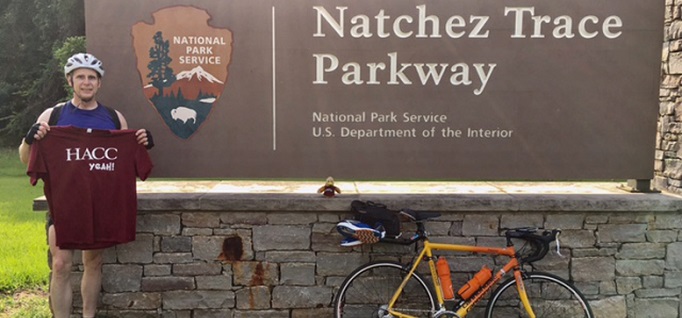The 655-mile man
By Ellie Ashford
June 14, 2017
A bicycle trip raised funds and awareness for a Pennsylvania community college.
John J. Sygielski’s 655-mile bike ride this spring not only raised funds for students in financial need, it gave Dr. Ski, as he is known, an opportunity to briefly put aside from his mind the daily duties of his job as president of HACC, Central Pennsylvania’s Community College.
The “Tour de Dr. Ski” raised $4,000 through a GoFundMe crowdfunding campaign, exceeding the original goal of $1,500, which was later boosted to $3,000.
Sygielski takes a marathon bike ride every year, and the 2017 trip – winding through Louisiana, Mississippi and Tennessee – had a special objective: to support funds for HACC’s emergency fund for students struggling with homelessness or who face an unexpected expense, such as a car breakdown, a medical need or insufficient cash to pay an electric bill.
The emergency fund “helps students stay in college and finish a semester or program,” Sygielski says. Students in need can apply for a one-time grant of up to $500.
On the road again
The Tour de Dr. Ski started in New Orleans on May 26 and ended up in Nashville on June 2. Sygielski averaged 93 miles a day, which is quite an accomplishment, “especially for an old man like me at age 58,” he says.
Along the way, Sygielski visited several institutions of higher education: the office of the Louisiana Community and Technical College System, Baton Rouge Community College in Louisiana, Holmes Community College and Itawamba Community College in Mississippi, the University of Mississippi – Tupelo, Mississippi University for Women and the headquarters of the Phi Theta Kappa Honor Society in Jackson, Miss.
Much of the route was along the Natchez Trace Parkway, a scenic two-lane road without commercial traffic. Sygielski had no major problems on the ride, although there was a severe thunderstorm, and at one point he ran out of drinking water and had to flag down an RV to ask for some. Overnight stops were at B&Bs reserved in advance.
Sygielski says he met a lot of nice people along the way, including an older couple who shared a watermelon and a man who owned a restaurant in Tupelo, “who took me home, fed me and gave me a tour of the town.”
The trip also offered history lessons, Sygielski says, which he shared with his students via Facebook and Twitter. He visited three state capitols, and he learned about Meriwether Lewis (of pioneers Lewis and Clark fame) when he came upon a memorial to the explorer on the Natchez Trace in Tennessee.
Other benefits of the ride include improved fitness for Sygielski, inspiration for HACC students and staff to push themselves and stay fit and healthy, a chance to market HACC in conversations with people along the route, and alone-time to think.
A time to reflect
Sygielski calls the yearly solo trip “my monastic time to reflect – to think about the academic year that just passed, plan for the year ahead and reflect on my own leadership.”
“Bike riding is a great way to see things,” he says, to satisfy one’s curiosity about what’s down the road, “to feel free, zone out and think about things or not think about things.”
Last year’s Tour de Dr. Ski went through New York and Massachusetts, including a stint along the Erie Canal. Sygielski won’t decide on a route for the 2018 Tour de Dr. Ski until next spring.


